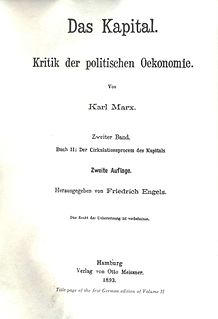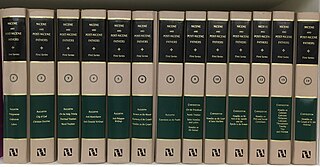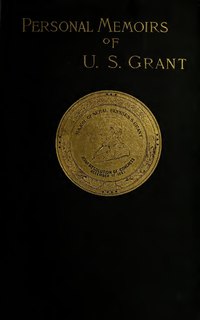 W
WDas Kapital, also called Capital. A Critique of Political Economy, is a foundational theoretical text in materialist philosophy, economics and politics by Karl Marx. Marx aimed to reveal the economic patterns underpinning the capitalist mode of production in contrast to classical political economists such as Adam Smith, Jean-Baptiste Say, David Ricardo and John Stuart Mill. While Marx did not live to publish the planned second and third parts, they were both completed from his notes and published after his death by his colleague Friedrich Engels. Das Kapital is the most cited book in the social sciences published before 1950.
 W
WCapital, Volume II: The Process of Circulation of Capital is the second of three volumes of Capital: Critique of Political Economy. It was prepared by Friedrich Engels from notes left by Karl Marx and published in 1885.
 W
WA Select Library of the Nicene and Post-Nicene Fathers of the Christian Church, usually known as the Nicene and Post-Nicene Fathers (NPNF), is a set of books containing translations of early Christian writings into English. It was published between 1886 and 1900. Unlike the Ante-Nicene Fathers which was produced by using earlier translations of the Ante-Nicene Christian Library (ANCL), the Nicene and Post-Nicene Fathers was printed simultaneously in Europe and in America, by T. & T. Clark, by Christian Literature Company and other American editors. T. & T. Clark was surely convinced by the commercial success of the cheaper American version/revision of the ANCL, although of lesser quality on some minor points. An American, Philip Schaff, was commissioned to supervise the first series of the NPNF. He was joined by the British Henry Wace for the second series.
 W
WThe Personal Memoirs of U. S. Grant is an autobiography by Ulysses S. Grant, the 18th President of the United States, focused mainly on his military career during the Mexican–American War and the American Civil War, and completed as he was dying of throat cancer in 1885. The two-volume set was published by Mark Twain shortly after Grant's death.
 W
WThe Revised Version (RV) or English Revised Version (ERV) of the Bible is a late 19th-century British revision of the King James Version. It was the first and remains the only officially authorised and recognised revision of the King James Version in Britain. The work was entrusted to over 50 scholars from various denominations in Britain. American scholars were invited to co-operate, by correspondence. The New Testament was published in 1881, the Old Testament in 1885, and the Apocrypha in 1894. The best known of the translation committee members were Brooke Foss Westcott and Fenton John Anthony Hort; their fiercest critic of that period was John William Burgon.
 W
WSpiritism is an 1885 book by German philosopher Eduard von Hartmann, the author of the famous treatise Philosophy of the Unconscious. In professor Corinna Treitel's opinion, publication of this book became one of the "key events" in history of the "German occult movement." This book was "one of the first works to attempt a complete psychological explanation of all occult phenomena." According to Charles Massey, one of the founders of the Society for Psychical Research, publication of this book made the "most brutal blow" out of all ones that were ever directed against Spiritualism.
 W
WThe War of Anti-Christ with the Church and Christian Civilization is a book written in 1885 by an Irishman, Msgr George F. Dillon, DD. It was republished in a slightly edited form by Fr Denis Fahey in 1950 as Grand Orient Freemasonry Unmasked as the Secret Power Behind Communism. The central theme of the book alleges that atheistic Illuminism, through the infrastructure of Grand Orient freemasonry, driven by the ideology of the philosophes laid the foundations for a large scale, ongoing war against Christendom in general and the Catholic Church in particular. The document claims that it had been manifested primarily through manipulating the outbreak of various radical liberal republican revolutions, particularly those focused on atheism or religious indifferentism in their anti-Catholicism. The book details revolutionary activity in France, Italy, Germany and Ireland.